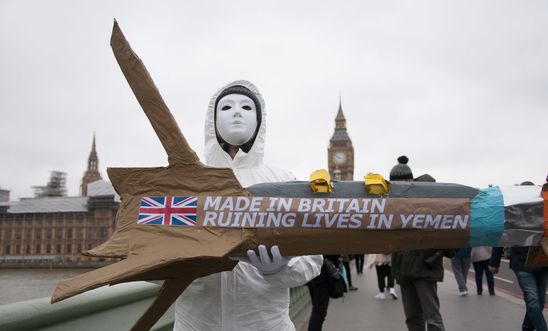
Press releases
Arms to Saudi Arabia: Five giant missiles delivered to Downing Street one year since start of Yemen conflict

Campaigners from Amnesty International today delivered five giant dummy missiles to Downing Street today to draw attention to the UK government’s refusal to halt exports of UK-manufactured arms to Saudi Arabia despite the clear risk that they could be used to commit war crimes in Yemen.
The missiles - 1.8-metres-long replicas of the 500lb “Paveway-IV” weapon which are currently used by Saudi Arabia’s UK-supplied Eurofighter Typhoon war planes - will bear the message “Made in Britain, destroying lives in Yemen”.
Last year the UK transferred 58 combat aircraft and 2,400 missiles to Saudi Arabia, with the majority of this weaponry sold after Saudi Arabia’s deadly intervention in the conflict in Yemen.
More than 3,000 civilians including 700 children have been killed in the last year. At least 2.5 million people have been forced to flee their homes and at least 83 per cent of the country’s population are in dire need of humanitarian aid.
Amnesty International UK’s Arms Programme Director Oliver Sprague said:
“It’s absolutely shocking that the UK is still selling billions of pounds’ worth of weapons to Saudi Arabia even as the civilian casualties have mounted and mounted in Yemen.
“It’s hardly a matter of pride that misery in Yemen is Made in Britain.“How much more devastation and carnage do we need to see in Yemen before the British Government keeps to its commitment to laws on arms trade, and suspend arms sales for the Saudi war machine?”
Since a bloody conflict erupted in Yemen a year ago, thousands of Yemeni civilians have been killed and injured, many in devastating airstrikes conducted by a Saudi Arabia-led military coalition. The UK is a major supplier of weaponry to the Royal Saudi Air Force - issuing licences for arms exports valued at £2.8bn between April and September last year, a period when civilian deaths in Yemen soared.
As well as suspending such arms sales to Saudi Arabia, Amnesty is urging the UK government to support the creation of a United Nations inquiry into the conduct of the conflict in Yemen, a conflict in which Houthi insurgents have also committed numerous breaches of international humanitarian law. Amnesty is also calling for the UK to carry out a full review of its recent arms exports to Saudi Arabia.
Government refusal to halt arms exports
Amnesty has repeatedly called on the UK Government to suspend all sales of arms to Saudi Arabia and its coalition partners that are capable of being used to commit human rights violations in Yemen (see www.amnesty.org.uk/yemen).
Last month this call was echoed by the parliamentary International Development Committee, while in December a group of leading international law experts issued a comprehensive legal opinion showing that continued UK weapons exports to Saudi Arabia breached the UK’s own laws and international laws. In repeatedly refusing to halt arms sales to Saudi Arabia, UK ministers have argued that there is “no evidence of deliberate breaches of international humanitarian law” by the Saudi-led coalition in Yemen. However, attacks - whether deliberate or not - that fail to adequately protect civilians are considered violations of international law. The UK has a legal obligation to avoid supplying weapons where there’s a clear risk that the weapons could be used to violate international law.
Paveway-IV missiles
The Royal Saudi Air Force is a major purchaser of Eurofighter Typhoon war planes which carry up to six Paveway-IV missiles during combat missions. The Paveway-IV missile is a 500lb guided bomb assembled and supplied by the Raytheon arms company’s Glenrothes plant in Scotland. Last year the UK transferred 58 combat aircraft and 2,400 Paveway-IV missiles to Saudi Arabia, with the majority of this weaponry sold after Saudi Arabia’s deadly intervention in the conflict in Yemen.